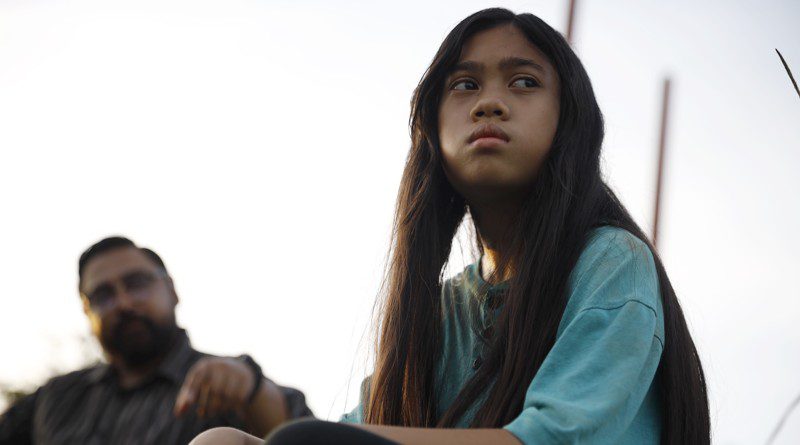Walid (2023) Review
Areel Abu Bakar, whose directorial debut in Geran (internationally titled The Deed of Death) won the Daniel A. Craft Award for Excellence in Action Cinema at the 19th New York Asian Film Festival and Special Jury Award at the 31st Malaysian Film Festival, returns with another silat gayong-based action thriller, Walid.
The movie stars Megat Sharizal in the lead role as the titular character, who teaches underprivileged children in the village. After noticing a young girl from another village named Aisha (Putri Qaseh Izwandy), who often sneaks around to watch his class from afar, he gladly gives her a lesson on how to read and write. They soon formed a father-daughter-like relationship, a result where Aisha’s overprotective mother, Kinang (Geran‘s Feiyna Tajudin, who also gets to showcase her silat gayong prowess against the assailants using a cindai cloth) doesn’t feel comfortable with her hanging around with Walid. Then, one day, Aisha along with some of the children is kidnapped by a local syndicate, forcing Walid to take action to locate Aisha at all costs.
Abu Bakar, who also co-wrote the screenplay with Geran‘s Hafiz Derani sets up the movie with a deliberate first hour, establishing the bond between Walid and Aisha. The slow buildup may have been a turn-off for those looking for a fast-paced action thriller. But it does help in making us care and root for these two characters. For instance, we subsequently learn that Walid’s keen interest in teaching and nurturing Aisha like his own daughter has to do with his past.
Aisha, in the meantime, finds herself like an outcast within the village community as the locals looked down on her and her mother because they are “outsiders”. The latter instantly reminds me of Muzzamer Rahman’s atmospheric black-and-white drama, Prebet Sapu (Hail, Driver!), both of which portray the characters as outsiders of sorts trying to make a living or in the case of Walid, Aisha and her mother just wanted to live in peace like everybody else and treated with the same respect.

At one point, there’s a scene where some of the locals feel uncomfortable and can’t stand the sight of Aisha hanging around in their village. Abu Bakar subtly addresses the xenophobia theme in his movie without hammering it down completely. The added character depiction of Walid as a moral compass strikes a fine balance between the movie’s aforementioned theme and his fair-minded viewpoint that everyone should have equal human rights.
Then comes the action-packed second hour, which looks as if Abu Bakar has thrown whatever subtle commentary and character-driven drama out of the window in the earlier parts of the movie. It’s like watching two different movies in a single feature. The kind that it doesn’t afraid of flipping a switch by giving it a drastic tonal shift. A tonal shift that recalls the works of golden-era Hong Kong movies, where the combination of action, drama and comedy are joined together in a staccato manner.
Embracing Walid as such would be the best way to enjoy the movie, even though the hour-long action sequences tend to grow tedious every now and then. There’s a strong sense of B-movie energy here as Abu Bakar, who is also responsible as the movie’s action director alongside fight choreographer Khoharullah Majid, doesn’t shy away from staging violent action set pieces. Not as graphically violent as say, The Raid duology but good enough to keep the martial arts movie fans happy with its no-holds-barred, silat gayong-style fight scenes.
Abu Bakar — yes, he happens to be the cinematographer as well — employs the same hyper-kinetic camerawork previously seen in Geran, immersing the audience in the brutality of the fight scenes. Arms are getting snapped like twigs, characters have their throats slit and even contains a scene with Walid dispatching the bad guys using small axes. Abu Bakar’s cinematography also sees the multihyphenate filmmaker manages to capture the idyllic charm of the movie’s rural setting shot in various Kedah locations including Gurun and Pantai Murni.
Speaking of Walid, Megat Sharizal proves he can do well in the action department (I just can’t help seeing him as a Malaysian version of Sammo Hung) as he does on the dramatic side. He shares wonderful on-screen chemistry with Putri Qaseh Izwandy, who delivers a sympathetic supporting turn as Aisha. The movie also features Namron, who made quite an impression as the remorseless leader of the child-trafficking syndicate, Pak Ku.
True to its B-movie vibe, Abu Bakar incorporated a few comedy moments (the part where Walid killed one of the bad guys and throws in a sardonic quip comes to mind) but thankfully, he doesn’t overwhelm them to the point they feel cringey. Similar to Geran, Abu Bakar’s latest directorial effort retains some of its rough-around-the-edges moments, i.e., side characters such as the two dedicated cops’ quest to apprehend the kidnappers are hastily added. But overall, Walid remains an effective mix of poignant drama and gritty action thriller worth checking out.
Walid sets to open at Cinema Village in New York on July 28 and Laemmle Glendale in Los Angeles on August 11, 2023, before making its way to Malaysian cinemas on 14 September.





